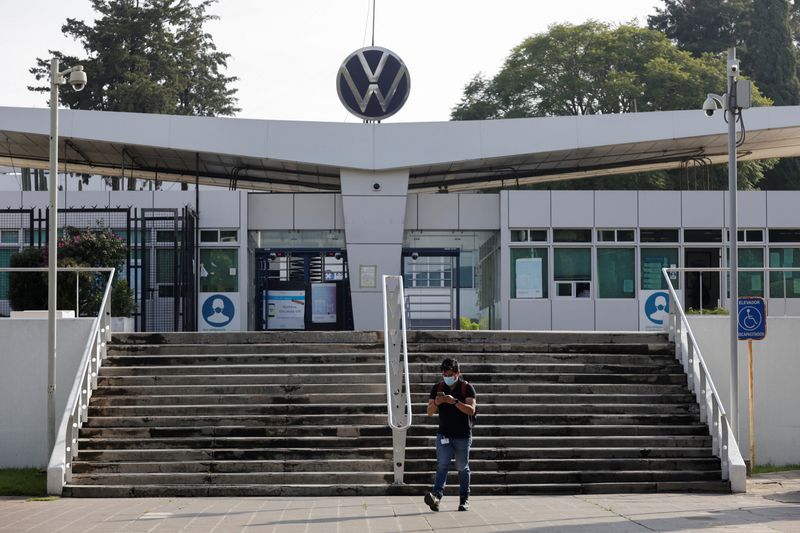By Nick Carey
LONDON (Reuters) -Donald Trump's pledge to slap tariffs on imports to the U.S. from Mexico could be more damaging for European car makers like Volkswagen (ETR:VOWG_p) and Stellantis (NYSE:STLA) and their suppliers than any direct tariffs on EU goods, according to data, analysts and experts.
U.S. president-elect Trump said he would impose a 25% duty on imports from Canada and Mexico until they clamped down on drugs and migrants crossing the border, a move that would appear to violate a free-trade deal between the three countries.
If implemented, the extra tariffs will raise questions about the future of global automakers' operations in Mexico, where many have built factories to take advantage of relatively cheap labour and close proximity to the lucrative U.S. market.
Some could opt to boost operations in the United States and shift production from Mexico.
Europe's luxury brands, which have neither U.S. nor Mexican production, will meanwhile be watching to see if Trump follows through with threats of European tariffs that would raise prices for U.S. buyers of their cars.
European carmakers with major operations in Mexico include Stellantis and Volkswagen, whose shares fell 4.7% and 2% respectively on Tuesday.
In a client note, Bernstein analysts said Trump's threats to apply tariffs soon after he takes office in January gave automakers and suppliers too little time to adapt to huge supply chain changes.
"The ... ramifications for U.S. manufacturers of Mexico and Canada tariff(s) are so large, it seems difficult to contemplate that yesterday's announcement is more than a bargaining chip at this point in time," they wrote.
Automakers face a big hit when they are already struggling with a downturn in demand, rising costs, a slower-than-expected transition to electric vehicles and growing competition from Chinese rivals like BYD (SZ:002594).
Mexico is a mainstay of supply for the U.S. auto market. In dollar terms, the United States imported around the same amount of cars from Mexico as it did from Europe in 2023, but almost four times the amount of car parts.
Nearly 80% of cars exported from Mexico between January and July this year went to the U.S. - some 1.57 million vehicles, according to the Mexican Automotive Manufacturers Association.
For Stellantis, the world's 4th largest carmaker, every additional percentage point of duties on imports from Mexico could reduce pre-tax profits by about 160 million euros, or 1.4% of 2025 expectations, Intermonte analysts estimated.
That equates to between 3.6 billion euros ($3.8 billion) and 4 billion euros, according to Reuters calculations.
The Franco-Italian automaker is open to revising a planned push into lower-cost countries, including Mexico, should Trump impose tariffs, the head of its Ram pickup brand told Bloomberg last week.
Stellantis operates two assembly plants making high-margin vehicles in Mexico: Saltillo, which makes Ram pick-ups and vans, and Toluca, for the Jeep Compass mid-sized SUV.
Current tariffs on exports from Mexico to the United States vary between 0% and 2.5% based on the origin of components, Intermonte said.
Some 65% of the cars that VW sells in the United States would no longer be competitive if duties were added to Mexican imports, Stifel analysts said.
Its Puebla auto factory is Mexico's largest and one of the biggest in the VW Group, making nearly 350,000 cars in 2023, including the Jetta, Tiguan and Taos - all for U.S. export.
The German carmaker's U.S. business is far more exposed to Mexico than its European operations would be. Shipping data shows Volkswagen U.S. has imported around 10 times as much from Mexico so far this year than it has from Europe.
VW and Stellantis declined to comment on Tuesday.
SOME PROTECTION
Automakers and suppliers will be trying to run different scenarios without knowing what, if anything, will happen.
"Based on what we've seen with Trump in the past, he'll use the threat of tariffs as leverage," said Nick Klein, a Chicago-based vice president at global logistics firm OEC Group. "But it's impossible to say what he'll do."
Some companies are well-positioned to step up U.S. production, potentially blunting the impact of tariffs, although few have cash to splash during the current downturn.
Mercedes-Benz (OTC:MBGAF) and BMW (ETR:BMWG) could produce more at their U.S. plants, but new models would require hefty investments in tooling. Both German automakers export cars from the U.S., which could qualify them for tariff refunds.
More than half the 410,793 cars built at BMW's Spartanburg, South Carolina plant in 2023 were exported. Some of those could instead be sold locally, CEO Oliver Zipse told analysts during a Nov. 6 call.
"There's some natural cover-up against possible tariffs," he said.
The rise in U.S. protectionism under presidents Trump and Joe Biden, plus supply chain shocks during the COVID pandemic, mean many suppliers have already invested in plants there.
U.S. investments by European automakers and suppliers are mostly in states like South Carolina that generally vote for Trump's Republican Party. European firms have accounted for $12 billion, or 58%, of $20.7 billion in automotive investments there since 2006 - dwarfing the $3.8 billion from U.S. firms.
Around 40% of the state's top-tier suppliers are German or French.
Continental, which has plants in Mississippi, Ohio, South Carolina and Illinois, "follows the principle 'local for local', and therefore we produce in the U.S. for the U.S. market," said CFO Olaf Schick.

"We plan to continue to invest there, regardless of who's president."
($1 = 0.9532 euros)